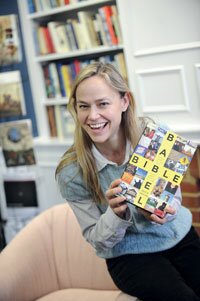FACETIME- Paradoxical: <i>Bible Babel</i> explains it all

Kristin Swenson
PHOTO BY JEN FARIELLO
Kristin Swenson is from Minnesota. She's blonde, petite, and so young-looking, it's hard to believe she's a 44-year-old religious studies professor whose just-released Bible Babel: Making Sense of the Most Talked About Book of All Time is getting rave reviews for its breezy style and non-dogmatic approach.
"I'm not trying to teach or interpret," says Swenson, who's in Charlottesville as a visiting fellow at the Virginia Foundation for the Humanities on a break from teaching at VCU. "I didn't want to be off putting to people of faith."
Washington Post reviewer Michael Dirda notes Swenson's readability, and her inclusion of pop culture Biblical references in The Omen, The DaVinci Code, and Madonna, as well as a Christian website that sells sex toys.
"This is not your father Abraham's guide to the Good Book," he warns in a thumbs-up review. "Given that the Bible is so often the locus of ignoble contention," he writes, "it's good to read a book that simply presents the facts."
Mostly, Swenson wants her book to be a good read with a "wow factor" on every page from people learning something they didn't know before.
She was raised in Lake Woebegone, or a place "remarkably like that," she laughs. "People are pretty laconic," she says, throwing in a Sven and Ole joke.
More stereotype-defying is that although steeped in a Lutheran tradition, she grew up with ample room for inquiry.
"I don't remember discouragement about asking questions about the book considered God's word," she says. "I've always loved paradox. The Bible does that a lot."
For instance, the commands to kill– and to not kill. "I like that it messes with us, but that seems authentic," says Swenson. "It invites debate."
In the Bible, nothing is quite as clear-cut as some insist, according to Swenson. On controversial topics such as homosexuality, abortion, or prosperity, "I'm not arguing for a particular position," she says. "I'm laying out what people use to prove their points of view–" however different those points of view might be.
She started off studying biology, but an intro to Biblical Hebrew class changed her course.
"The first word in the Bible can be translated in three different ways," she discovered. From there, she went on to study Greek and Aramaic.
"It's clear she's done the heavy lifting because she knows the original languages," says Martien Halvorson-Taylor, another visiting Foundation fellow. "She knows the scholarship, but she's not going to burden her readers with that."
The Bible may look like any other book, says Swenson, but it's not; and that's what makes it so challenging. "It's an anthology, poetry, narration, legal material, letters, apocalyptic texts," she lists. "It's several literary styles that have developed over thousands of years." Not to mention getting written in three different languages.
Although Bible Babel was just released in February, Swenson knows she's just skimmed the holy surface, and she's already working on her next project: supernatural beings in the Bible.
Can a movie option be too far off?
#